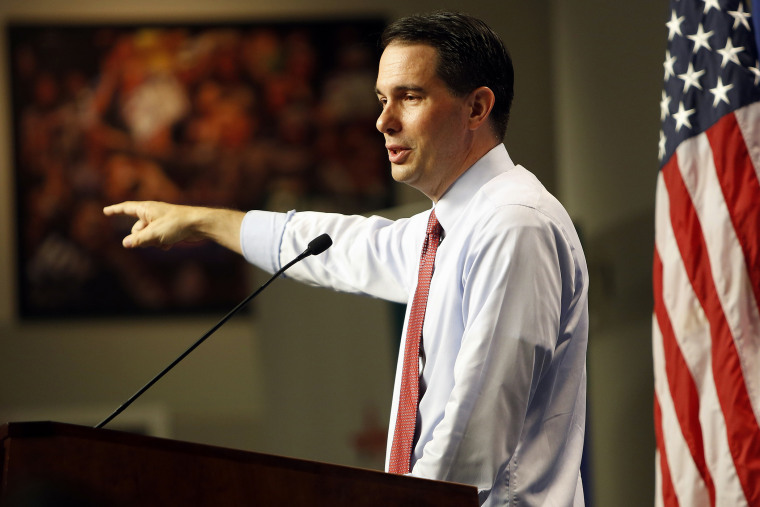A couple of weeks ago, Wisconsin Gov. Scott Walker became the latest Republican presidential candidate to somehow tie President Obama to violence against police. The far-right governor
published a piece on a conservative blog, suggesting the White House bore some responsibility for Americans "using law enforcement as a scapegoat."
In an interview with CNN's Jake Tapper on "State of the Union," the Republican presidential candidate said Obama hasn't offered enough support for police who are "overwhelmingly doing the right thing every day." "He's praised them, but he's not speaking out about the fact that this rhetoric out there," Walker said. "And when you've got people say, we have people say 'pigs in a blanket' at a rally, 'fry 'em up like bacon,'" he said. "That's the kind of thing you need to speak out about. You need to say that is wrong."
Wait, that's it? That's the argument? Walker has apparently heard some random people saying obnoxious things about law enforcement at unnamed rallies, and the far-right governor believes such comments have risen to the level of presidential condemnation?
Look, if you're going to tie a sitting president of the United States to violence against police officers, at least try to back up your inflammatory rhetoric with something. At this point, it's hard to imagine even Walker's allies taking this rhetoric seriously.
In March, reflecting on the crisis in Ferguson, Obama said, “The overwhelming number of law enforcement officers have a really hard, dangerous job, and they do it well and they do it fairly, and they do it heroically. And I strongly believe that. And the overwhelming majority of police departments across the country are really thinking hard about how do we make sure that we are protecting and serving everybody equally. And we need to honor those folks, and we need to respect them, and not just assume that they’ve got ill will or they’re doing a bad job.”
But apparently, this didn't count, because the president didn't add, "Don't say, 'pigs in a blanket.'"
Walker's weak argument does, however, raise related questions about the broader societal issue. In Republican politics and conservative media, there's a "war on cops" -- at least some of which, they claim, should be blamed on the president.
Let's be very clear about something: the goal in American society should be zero incidents of law-enforcement officials killed in the line of duty. Even one murder of an officer is one too many.
That said, the
Washington Post ran
a piece last week from Radley Balko, who examined the latest data. Republican rhetoric is shaping public opinion, but it's also painting a misleading picture.
So far, 2015 is on pace to see 35 felonious killings of police officers. If that pace holds, this year would end with the second lowest number of murdered cops in decades. [...] But these are just the raw numbers. If we look at the rate of killings of cops, the trend is more pronounced. There are two ways examine the rate of police killings. The first is to look at the rate of killings of cops per 100K cops on the street. This figure is somewhat difficult to calculate because there are widely varying estimates of how many cops are on the street. It depends on how you define “police officer,” who is doing the estimating, and various other factors. But if you use consistent sources, the number of police has generally gone up, while the number of officers killed has generally gone down. The other way you could measure the rate of killings of police officers is to look at the number with respect to the overall population.... [B]y this measure 2015 is shaping up to be the second safest year for police ever, after 2013.
The
piece is worth reading in full, and pay particular attention to the historical data. Homicides of cops soared during Prohibition, followed by a sharp decline, before spiking again in the late 1960s and early 1970s.
By Scott Walker's reasoning, should Americans at the time have blamed Nixon?
